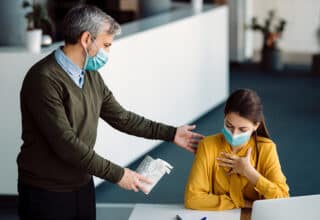If you have ever found yourself having sudden stomach cramps, nausea, and urgent need to rush to the loo—you’ve probably wondered if it is food poisoning or stomach flu?
Both of these conditions share many similar symptoms which makes it difficult to tell them apart. However, understanding their differences is important as it can help you manage your symptoms better and know when it’s time to seek help.
Let’s understand the similarities and differences between food poisoning vs stomach flu, including their symptoms, causes, treatment, and prevention.
Food Poisoning vs Stomach Flu: Key Differences at a Glance
| Food Poisoning | Stomach Flu | |
| Cause | Bacteria, viruses, or parasites | Viruses |
| How you catch it | Consuming contaminated food or water | Contact with infected people or contaminated surfaces |
| Onset of symptoms | 2–6 hours after eating contaminated food | 12–48 hours after exposure |
| Duration | Typically last from a few hours to a few days | Usually few days up to a week |
| Severity of symptoms | Usually severe and resolve quickly | Usually mild and take longer to resolve |
| Treatment | Rest, fluids, and sometimes antibiotics (for bacterial cases) | Rest, fluids, electrolyte replacement |
Food Poisoning vs Stomach Flu
What is Food Poisoning?
Food poisoning is a type of foodborne illness that happens when you eat food or drink water contaminated with bacteria, viruses, parasites, or toxins.
It is more common than stomach flu and affects millions of people every year.
What is Stomach Flu?
Stomach flu is a common term for “viral gastroenteritis” in which viral infection causes inflammation of stomach and intestine.
It is very common and spreads easily especially in places like schools, hospitals, and care homes.
Symptoms of Food Poisoning
Symptoms of food poisoning typically appear within 2 to 6 hours after eating contaminated food. However, in some cases it can take longer—upto several days.
Common symptoms include:
- Stomach cramps
- Nausea and vomiting
- Diarrhoea (may contain blood or mucus)
- Fever and chills
- Sweating
- Headache
- Fatigue or weakness
- Loss of appetite
- Generally feeling unwell
In most cases, people get better within 1–2 days. But some cases can be more severe—especially when caused by the bacteria that produces toxins, such as Clostridium botulinum (which causes botulism).
Symptoms of Stomach Flu
Symptoms of stomach flu usually start 12 to 48 hours after exposure. These symptoms may include:
- Diarrhoea
- Stomach cramps
- Fever
- Weight loss
- Joint aches
- Muscle pain
- Headache
- Generally feeling unwell
In most cases of stomach flu, symptoms last for a few days and go away on their own.
However, in young children, older adults, and people with weakened immune systems, it can last longer and sometimes cause complications like dehydration.
Causes of Food Poisoning
Food poisoning is caused when bacteria (such as Staphylococcus aureus and Salmonella), viruses (such as hepatitis A), or parasites (such as Giardia) that contaminate the food.
You can get food poisoning by eating or drinking contaminated food.
There are other ways as well through which you can get food poisoning, such as
- By eating undercooked meat, poultry, or seafood
- Eating unwashed fruits or vegetables
- Improperly stored or reheated leftovers
- Raw eggs or dairy products
- Cross contamination in kitchen (by using same cutting board for raw chicken and vegetables)
Causes of Stomach Flu
There are different viruses that cause stomach flu. The common ones include:
- Norovirus (most common)
- Rotavirus
- Astrovirus
- Adenovirus
It passes through contact with an infected person, touching contaminated surfaces, or consuming food or water that has been exposed to the virus.
Treatment of Food Poisoning
If your symptoms are mild, you can usually manage food poisoning at home—with rest and hydration, fever reducing medicines, and giving your stomach some break by eating bland foods for a few days.
However, you should see your doctor if you experience symptoms like:
- Diarrhea that lasts for more than 3 days
- High fever (over 101.5°F or 38.6°C)
- Blood in your stool or vomit
- Prolonged vomiting or inability to keep liquids down
- Signs of dehydration (dry mouth, dizziness, dark urine)
- Symptoms that last more than 3 days
In severe bacterial cases, you might need antibiotics or hospital care.
Treatment of Stomach Flu
There’s no specific treatment for stomach flu. Most of the time you can treat it at home.
You can help your recovery by:
- Taking time to rest and recover
- Drinking plenty of fluids—water, herbal teas, or oral rehydration solutions
- Avoiding caffeine, sugary drinks, sodas, spicy and fried foods, and dairy for a few days
- Eating bland foods like toast, rice, bananas, and plain yogurt for a few days—util you feel ready
If your symptoms are severe, or last longer, you may need medical care.
Prevention of Food Poisoning
You can prevent food poisoning by:
- Washing your hands properly—especially after using toilet, before eating or handling food
- Cooking meat, poultry, and fish thoroughly to a safe temperature
- Keeping raw and cooked foods separate
- Washing fruits and vegetables before eating
- Avoiding unpasteurised milk and cheese
- Storing perishable foods promptly in fridge
- Thaw and reheat food properly
- Don’t eat or drink food that looks or smells questionable
Prevention of Stomach Flu
Despite the name of stomach flu, your annual flu vaccination will not prevent it.
To prevent stomach flu:
- Wash your hands frequently with soap and water
- Disinfect commonly touched surfaces regularly
- Avoid close contact with people who are unwell
- Stay home and avoid going to work or school for a few days after you feel better, to avoid spreading it
- Consider getting your baby vaccinated for rota virus when they’re 2 months old
When to See a Doctor
You should see your doctor if:
- Your symptoms persist beyond a few days
- You have high fever or blood in your stools
- You feel extremely weak, dizzy, or dehydrated
- You’re pregnant, elderly, or have a chronic illness
Final Thoughts
Though food poisoning and stomach flu can look similar, they have different causes and timelines.
Food poisoning usually hits faster and passes quickly while stomach flu develops slowly and can last for a few days.
In both cases, rest and hydration is the key. Most people recover fully at home—but don’t hesitate to contact your doctor if your symptoms persist or are severe.








